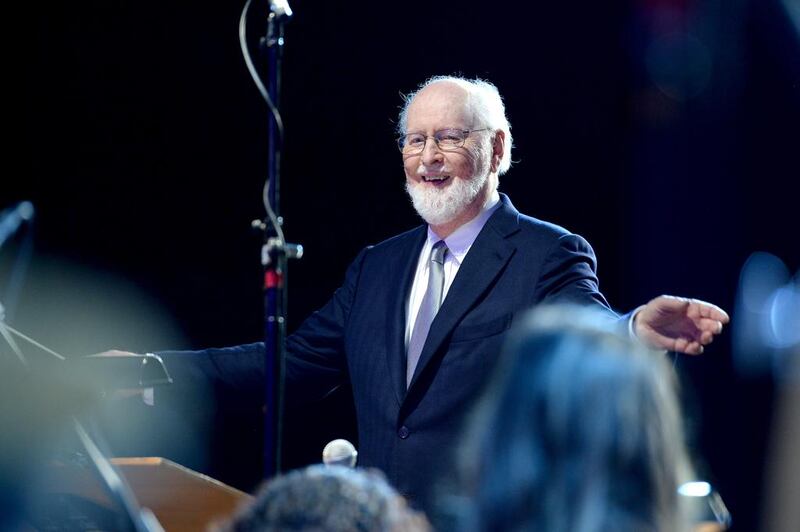Whether genetically engineered dinosaurs are on the rampage, schoolkids are helping a homesick alien find his way home or an adventurous archaeologist is battling Nazis, director Steven Spielberg’s movies always pack an emotional punch.
But their magic does not only rely on what you see on the screen, as audiences will discover this week when two classic Spielberg films – Raiders of the Lost Ark and Jurassic Park – are screened at Dubai Opera with a live orchestra providing the scores by composer John Williams.
He has written the music for almost all of Spielberg's films, beginning with the director's 1974 big-screen debut, The Sugarland Express. The famous Jaws music? That was Williams. So was the music from Close Encounters of the Third Kind, E.T. the Extra-Terrestrial and Saving Private Ryan, among many others.
Away from Spielberg, his work includes two of the best-known movie themes in cinema history – Star Wars and Superman – not to mention the first three Harry Potter movies. In short, his back catalogue is a roll call of classic blockbusters.
His genius – much like that of Spielberg – lies in a maverick ability to take on any genre and make it his own, for which he has been rewarded with five Oscars, four Golden Globes, seven Baftas and 23 Grammys. It is amazing to think it takes him just eight to 12 weeks to write such memorable music. And unlike the younger generation, he still does it the old-fashioned way – with a pencil and paper.
Some critics point out the similarities between his music and that of other composers. Luke's theme from Star Wars has echoes of Venus from Gustav Holst's The Planets, for example. Elements from his Superman score remind others of Richard Strauss's Death and Transfiguration. And the rich, romantic orchestral palette Williams so expertly puts to task certainly comes from the same musical world as the work of Richard Wagner.
Another trick Williams undeniably learnt from this German colossus of 19th-century music is the cunning use of “leitmotifs”: short melodies associated with particular characters. As in Wagner’s operas, they help tie a film together and add emotional weight.
They are so effective that when you watch a film such as Jaws or Star Wars, you could almost close your eyes and still follow the story, guided by the emotional hints and triggers you hear.
When the Imperial March starts to blast out in Star Wars, everyone knows Darth Vader is about to arrive.
Talking to Total Film magazine in 1997, Williams said: "Writing a tune is like sculpting. You get four or five notes, you take one out and move one around, and you do a bit more and eventually, as the sculptor says: 'In that rock there is a statue, we have to go find it'."
This insight into William’s technique reveals the dedication to his craft. “I spend more time trying to create those little musical signals than I do with anything else,” he adds.
It also provides the key to his success. As he has often said, his primary focus is always to create the best musical fit for the movie he is working on. Suggesting his music is derivative of other composers misses the point; by employing sounds evocative of other sources, Williams harnesses a shortcut to our emotions. Sure, this technique is a musical hack of sorts – but one that requires great skill to avoid sounding clichéd.
However, it is not only the big tunes Williams excels in. He is also a brilliant “painter in sound”.
Many of Spielberg’s films have music running almost continuously throughout. Williams is able to pick up on what is happening on the screen and enhance its dramatic potential.
One such gem is the scene in Raiders of the Lost Ark in which Indy is trapped in a temple. Williams sets the scene with creepy aural cues, including pizzicato strings, suggesting insects scuttling across the floor.
The music gradually wells up to the sound of rattles and the big reveal when Indy cries, “Snakes”, eyes wide open in fear.
The score for Jurassic Park contains many thrilling moments and it is amazing to think that Williams composed it in the same year as another, very different Spielberg opus, Schindler's List.
While the former may be overshadowed by the latter, there is no sign he skimped in the writing.
"Jurassic Park has a 95-minute score," he told Total Film. "It pumps away all the time. It is a rugged, noisy effort – a massive job of symphonic cartooning."
Now in his 80s and with more than 100 films to his name, you'd think that Williams would be slowing down. With scores for four films coming soon, including the next two Star Wars films and Indiana Jones 5, that does not seem to be the case – which should delight film lovers everywhere.
• Raiders of the Lost Ark in Concert is at Dubai Opera April 19 and April 21; Jurassic Park in Concert is on April 20 and April 21. Tickets start at Dh150 from www.dubaiopera.com
artslife@thenational.ae





